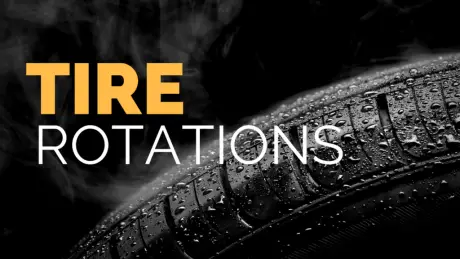
Tires play a significant role in the quality and safety of any car trip. When you replace the tires, it can be a costly procedure, and that is why it is crucial for you to make tire maintenance a priority.
In order to extend the life of your tires and optimize their performance, tire rotation is very crucial because each tire position may experience different rates and types of wear. With proper tire rotation patterns, the wear gets spread across all the tires evenly, which helps extend the tires' life.
What is a tire rotation?
When the position is each tire of a vehicle is periodically changed, this is known as a tire rotation. Usually, the tires must be rotated according to the recommendations of the tire manufacturer or 8000 km. For many people, tire rotation can be done when they get their car’s oil changed.
The significant advantage of rotating the tires on a regular basis is that you are able to get a good chance of visually inspecting the tires for any damage. You can also check the tire pressure, get it rebalanced if you notice any vibration, and check the tread depth.
How often should the tires be rotated?
The majority of tire manufactures recommend the tire to be rotated after every 8000 km. With the help of the owner’s manual, it can get easy for anyone to get an idea about how often tire rotation must be scheduled.
It is worth noting that one must always visit a reputable tire service center to ensure proper rotation. When a vehicle is taken in for tire rotation, it becomes important for the driver to inspect the tires for any damage, check the tread depth, and get a new pair if the tires are in bad condition.
Tire rotation patterns you should utilize
The wheel position that each of your vehicle tires should be moved depends on the tire type and the car you own. Before getting the tires rotated, it is essential for you to check the owner's manual to apply the suggested pattern and the mileage interval.
- When you have nondirectional tires with the front-wheel-drive vehicle, then it is always recommended to move the tires in the forward cross pattern, which means that the front tires should directly be moved to the back to the rear side, whereas the rear tires need to be moved towards the opposite sides of the vehicle’s front axle.
- You can also use an X-pattern by moving the vehicle's front tires to the opposite positions in the back and vice-versa.
- If you have a four-wheel-drive or a rear-wheel-drive vehicle with non-directional tires, you can go with the rearward cross pattern by moving the rear wheels to the front, while the front ones can be placed to the rear opposite sides of the axle.
Bottom Line
Tires are a substantial investment, and it does pay back nicely if you take care of them properly. When you have correctly inflated tires serviced regularly with a complete understanding of the tire rotation patterns, you must be sure that the tire will deliver you with an optimal tread life, value, and performance.
Same articles

Understanding Vehicle Inspection and Verification Services: Why They Matter for Every Driver
GuidesVehicle inspection and verification services are an essential but often overlooked part of keeping roads safe and cars legally compliant. Most people only think about inspections when it’s...
KLIFEX Brand Overview: High-Quality Automotive Repair Kits for Affordable Repairs
GuidesThe automotive aftermarket has long needed solutions that combine reliability, durability, and affordability. Many car enthusiasts and services are looking for a way...
Fast, Reliable Vehicle Emissions & Inspection Services Made Simple
GuidesFast, reliable emissions and inspection services are essential for keeping vehicles road-ready, compliant with environmental regulations, and safe for daily driving. If you’re looking for quick...

